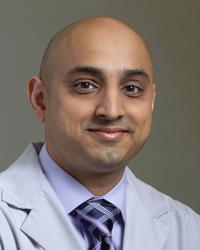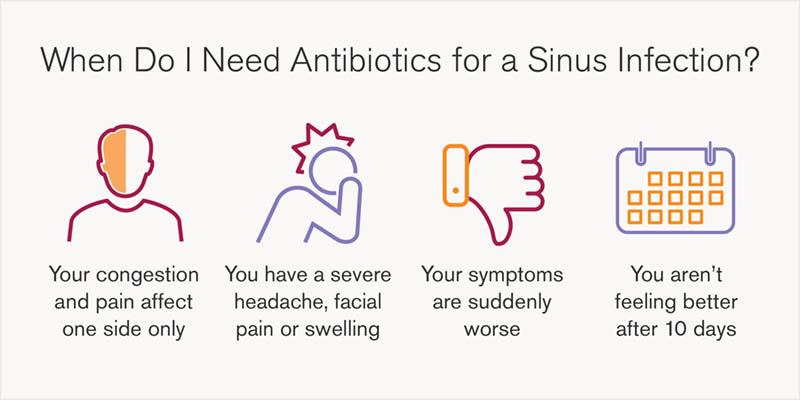Sinus Infection vs. Cold: When Do You Need an Antibiotic?
May 12, 2024
Categories: Health & Wellness, ENT/Otolaryngology
You know the feeling. It usually starts with a sore throat or runny nose. Soon, you’re stuffed up, coughing and miserable. Is it a common cold or a sinus infection?

Loyola Medicine otolaryngologist Chirag Patel, MD specializes in ear, nose and throat conditions. “Colds and sinus infections are common illnesses but can be complex to diagnose,” he says. “One key question is whether we should let the illness run its course or use antibiotics.”
What are the differences between a cold and sinus infection?
Colds and sinus infections are similar but unique conditions. It’s important to understand their causes and symptoms.
Common causes of colds and sinus infections
Colds are viral infections of the upper respiratory tract that spread from person to person. There are over 200 cold-causing viruses. Colds occur frequently in children. On average, adults experience two to three colds per year.
Sinus infections can be viral or bacterial. Your sinuses are a series of air-filled spaces behind your face that circulate air. They also produce a thin layer of mucous that drains into the back of your nose. “The constant production of mucous helps keep your sinuses clean,” says Dr. Patel. “Sinus infections occur when the passageways that connect these spaces become blocked. Mucous gets trapped and stagnates, allowing viruses or bacteria to grow.”
A cold can cause inflammation of your sinus tissue (sinusitis), which can lead to a sinus infection. Other conditions can also cause sinusitis and sinus infections, including:
- Allergies
- Diseases that affect the ability of your sinuses and lungs to clean themselves, such as cystic fibrosis and primary ciliary dyskinesia
- Poor dental hygiene
- Structural blockages such as nasal polyps or a deviated nasal septum
- Weakened immune system
Common symptoms of colds and sinus infection
The main symptoms of a cold include:
- Cough
- Mucous running down the back of your throat (post-nasal drip)
- Nasal congestion
- Runny nose
- Sore throat
- Sneezing
Cold symptoms usually peak within the first few days and then start to improve. Some symptoms can linger for 10 to 14 days.
Sinus infection symptoms are similar to those caused by a cold but may also include:
- Bad breath
- Facial pain or pressure
- Headache
In most cases, a sinus infection will resolve on its own. In rare cases, an untreated bacterial sinus infection can spread to the face, eye or even the brain, says Dr. Patel.
When do you need an antibiotic for a cold or sinus infection?
The viruses that cause colds and sinus infections do not respond to antibiotics. Even many bacterial sinus infections clear up on their own. Whether you need an antibiotic depends on your symptoms.
“Many people think that thick, colored mucous means they need antibiotics,” says Dr. Patel. “This isn’t always the case. When you have a cold, the mucous from your nose may change from clear to a yellow, green or brown color. This change may indicate a bacterial infection but could also be due to the natural breakdown of mucous proteins.”

What are common home treatments for colds and sinus infections?
For most colds and sinus infections, the best treatment is to rest and let your body heal. While you wait, there are many things you can do to feel better:
- Breathe in steam, but be careful of burns from hot water
- Drink plenty of fluids
- Flush your nasal passages with saltwater using a sinus rinse kit or device
- Take acetaminophen or ibuprofen for pain or fever
Over-the-counter medications can also help relieve symptoms. For over-the-counter nasal sprays, Dr. Patel recommends reading the label carefully to ensure correct usage. Types of nasal sprays include:
- Decongestant nasal sprays: Do not use these sprays for more than three days. Longer use can make your congestion worse.
- Saline nasal sprays: These sprays are similar to a sinus rinse and are safe for daily use.
- Steroid nasal sprays: These sprays can reduce inflammation but take one to two weeks to become fully effective. With daily use, they can help with chronic sinusitis but may not act fast enough for short-term colds or sinus infections.
When to talk to your doctor about a cold or sinus infection
As an otolaryngologist, Dr. Patel typically sees patients with frequent sinus infections or complications from a previous sinus problem. If you haven’t seen an otolaryngologist before, the best place to start is your primary care provider.
Dr. Patel recommends talking to your doctor if you have:
- Severe symptoms
- Symptoms that get better then worsen
- Symptoms that last more than 10 days and are not improving
Your doctor can assess your symptoms and determine if an antibiotic is appropriate or if you need to wait it out.
Loyola primary and specialty care offices are conveniently located throughout Chicago’s western and southwestern suburbs. To make an appointment, call 888-584-7888 or schedule an appointment online.
Chirag Patel, MD, is an otolaryngologist at Loyola Medicine and is board certified in Otolaryngology — Head and Neck Surgery. Dr. Patel received his medical degree from Jefferson Medical College. He completed his residency at Rutgers University and fellowship at the University of Pittsburgh Medical Center.
Dr. Patel specializes in treating people with advanced sinonasal diseases, including cancers and growths in the nose. He works with neurosurgeons to perform brain surgery through the nose. His research interests include brain tumor surgical techniques and quality of life outcomes in people with sinus issues and cancers.
Book an appointment today to see Dr. Patel or another Loyola otolaryngologist by self-scheduling an in-person or virtual appointment using myLoyola.
